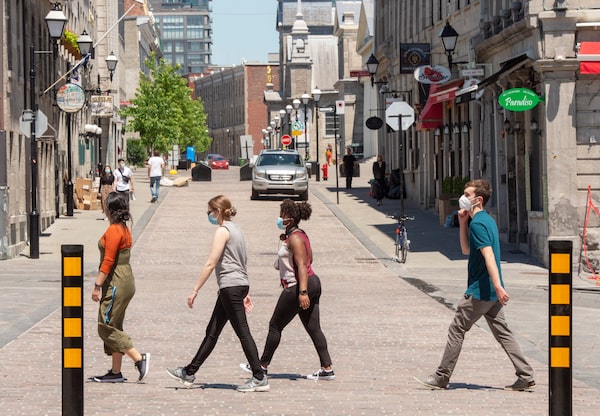
People wear face masks as they walk through Place Jacques-Cartier on June 16, 2020 in Montreal.Ryan Remiorz/The Canadian Press
By this time last year, Montreal had already moved into festival mode with the Formula One Grand Prix race kicking off a record tourist season that brought 11 million visitors to the city and pumped nearly $5-billion into the local economy.
This year, the core of Canada’s second-largest city remains eerily unfestive. Except for the teenagers looking for deals on running shoes and other trendy must-haves, and construction workers operating machinery as Sainte-Catherine Street undergoes a major makeover, Montreal’s main shopping drag is devoid of crowds at what is usually its busiest time of year. And there won’t be much to bring them back between now and Labour Day.
No Formula One. No Montreal International Jazz Festival. No FrancoFolies French music festival. No Just for Laughs comedy festival. No Osheaga outdoor concert marathon. Indeed, most of everything that makes summer summer in Montreal will be missing this year.
Downtown retailers and restaurants were already complaining about the construction and loss of parking spaces before the novel coronavirus pandemic struck. Now, the prospect of a summer without festivals has many of them fearing they will not survive to see the 2021 season.
Are hair salons or restaurant patios open in my province? A guide to Canada’s reopening and COVID-19
“Beyond the reopening question, the downtown Montreal zone is at risk because its vitality rests in large part on the traffic generated by the 310,000 workers, 11 million tourists and 100,000 students who patronize the sector, but who will not be returning for several more months,” according to a report prepared this month for Mayor Valérie Plante by a committee charged with developing plans for a postpandemic downtown recovery.
Montreal, the report added, faces “the spectre of serial bankruptcies” by retailers and restaurants that could reduce the city’s attractiveness as a tourist destination for years, as empty storefronts litter the downtown core and dozens of hotels shut their doors for good.
Tourism Montreal president Yves Lalumière predicts tourist industry revenue is on track to decline by 80 per cent this year from last year’s record total of $4.86-billion. The hotel occupancy rate is expected to fall from 85 per cent to barely 10 per cent this summer, with room rates set to plunge from the healthy $215 a night average in 2020.
Mr. Lalumière joined other Canadian tourist officials in writing to Prime Minister Justin Trudeau in late May, urging Ottawa to end to interprovincial travel bans or restrictions put in place in March to slow the spread of COVID-19.
Mr. Trudeau has so far ignored their pleas. Indeed, on Tuesday, Ottawa announced that the Canada-U.S. would remain closed to non-essential travel until at least July 21. For many downtown Montreal retailers and eateries, which typically generate as much as half of their summer revenue from tourists, it spells a death knell.
“Other countries, recognizing the unique value and economic contributions of their travel and tourism sectors, have already announced their intention to save the summer travel season,” Mr. Lalumière and his colleagues warned in their May 26 letter. “Each day that passes without a timetable for easing restrictions guarantees further loss of businesses, jobs and tax revenue throughout Canada.”
For Montreal’s downtown, which has faced stiff competition from online retailers and shopping “destinations” in the suburbs, a disastrous summer season would be a major setback for plans to revive Sainte-Catherine Street with a pedestrian-friendly makeover. The city is not yet halfway through the five-year, $1.3-billion project, which has left long stretches of the street dug up and closed to traffic as nearly century-old water works are replaced and sidewalks widened. While the final product promises to be stunning, it may come too late to make a difference.
Retailers with a street entrance were allowed to reopen in Montreal on May 25, although anecdotal evidence suggests business has been slow. Malls such as the Eaton Centre are set to reopen on Friday. Restaurants will be allowed to open next week, but with strict physical-distancing protocols that will prove unworkable for many.
Ivanhoé Cambridge, which is spending about $200-million to renovate its downtown Montreal Eaton Centre property, still aims to complete the project by early 2021, with Japanese retailer Uniqlo set to open its first Quebec location in the mall. But several other retailers are likely to shut their doors in coming months without an extended holiday on rent payments.
Last week, the federal and Quebec governments announced a $50-million aid package for small businesses in the downtown Montreal core that do not qualify for other public support measures already put in place during the pandemic crisis. But the low-interest loans and loan guarantees offered by the plan are unattractive to retailers and restaurants unwilling to take on new debt while business remains so depressed with no end in sight.
Organizers of the Formula One race are still holding out hopes their event can be rescheduled for the fall. And Just for Laughs plans to move its 2020 edition to late September. But the radio silence from Ottawa has made planning impossible for organizers and tourists alike. Economically speaking, for Montreal, the summer of 2020 is already a writeoff.
Sign up for the Coronavirus Update newsletter to read the day’s essential coronavirus news, features and explainers written by Globe reporters and editors.
 Konrad Yakabuski
Konrad Yakabuski